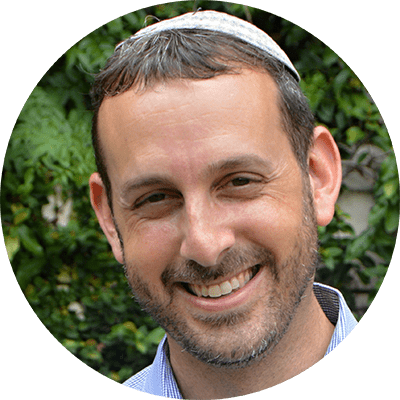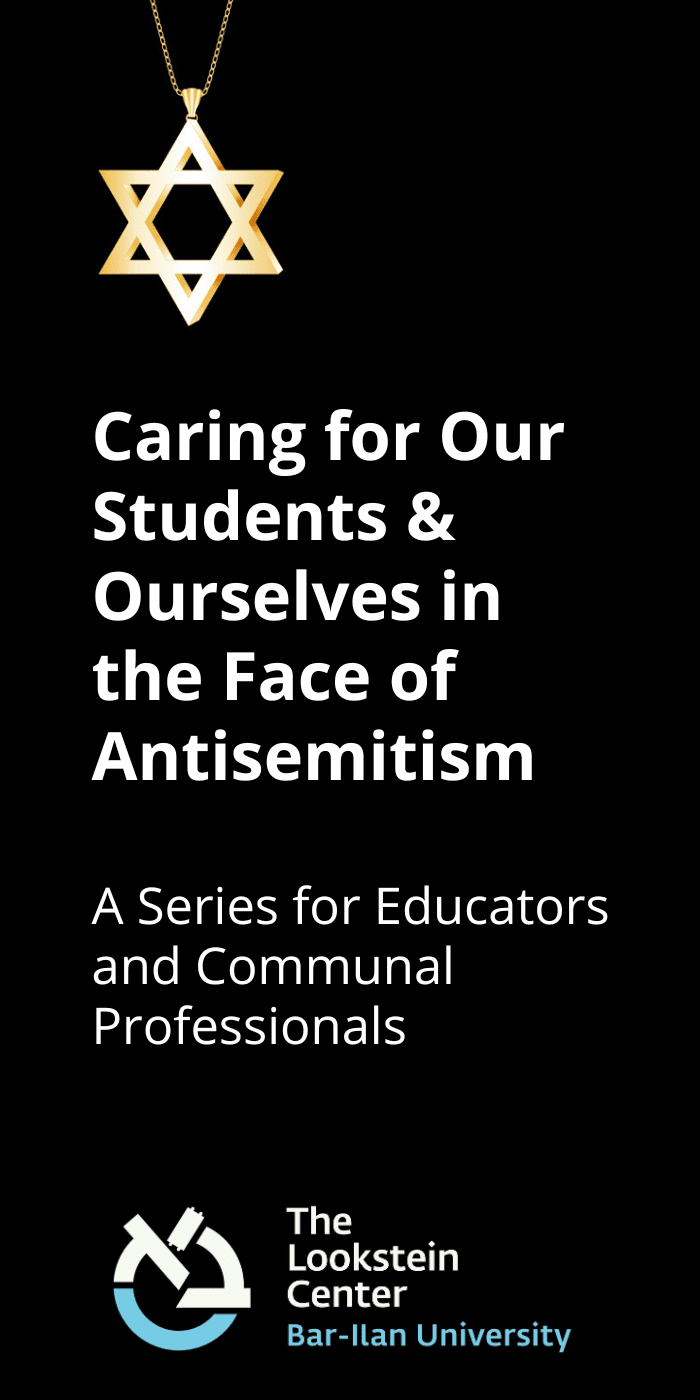Unstaffing the Staff: Innovations in Educator Recruitment and Retention in Jewish Day Schools

Ramon Widmonte is the Co-Founder and Dean of the Academy of Jewish Thought and Learning and the founder of the National Education Development. Rabbi Widmonte studied at Yeshivat Har Etzion, served in the IDF, and holds a degree in Mathematics & Computer Science and an MA in Jewish Education. He has translated two volumes of Maharal’s Tiferet Yisrael.
The Jewish educational community in South Africa, like much of the Jewish world, has been grappling with finding Jewish studies staff. The lack of educators is rapidly approaching a point of crisis. This article outlines some of the innovate initiatives we have taken to address this.
Economics and Social Profile
In their intriguing study of the interweaving of Jewish education and economics, Maristella Botticini and Zvi Eckstein present a bold thesis. They claim that for centuries, Jewish education created a virtuous circle for Jewish societies by ensuring that Jews were literate and numerate. That conferred upon them the ability to conduct trade and manage international financing, which was a competitive advantage over the surrounding, uneducated society. Thus, Jews had the means and incentive to invest further in Jewish education (which was the only education available at the time to them), which further enabled their economic prosperity, and so on. On the other hand, Botticini and Eckstein opine, when the economic circumstances changed and trade dried up, Jews quickly jettisoned their investment in Jewish education, entered farming and other subsistence-oriented professions, and later, due to their lack of Jewish education, intermarried and assimilated.
Their approach, while running a significant risk of reductionism, places the economic incentives of both Jews, as well as Jewish educators, at the forefront of the discussion. We believe that it deserves serious consideration as well. Jewish education in most communities worldwide is tremendously expensive, but the economic incentives for all stakeholders – parents, funders, and educators—have to be examined and aligned.
What Botticini and Eckstein do not address are glaring counter-proofs from Jewish history: eras wherein Jewish education provided absolutely no financial advantage when assimilation was possible and practical, and yet when Jews chose to invest all their material and existential efforts into educating their children Jewishly. As noted by Rabbi Yom Tov Schwartz, this indicates a society with different values; in particular, a society in which Jewish education and Jewish educators enjoy a socially elevated profile and esteem.
While the approach we adopted takes serious note of the economic drivers, we believe that it is the second point that deserves far greater emphasis: our societal values and priorities, and the way in which they are communicated.
“Staff”, “Personnel”, “Educators”, Self-Sacrifice, and Jewish Heroes
One of the common themes we observed when engaging with community leadership was the presumption that in choosing education, Jewish educators have consciously decided to earn less as they self-sacrifice on behalf of the Jewish people. Even more, they assumed that without such sacrifice, Jewish education would be unaffordable. What was remarkable was that when we asked these lay leaders if they had ever considered publicly lauding the teachers for their selflessness on behalf of the community, we were met with blank stares. There were no city-wide events lionizing these altruistic heroes, no special awards, no monuments to the educators who shaped our destinies. While we do have glitzy community awards, there are none for educators.
It was clear that there is a gap between assumption and reality—Jewish educators are seen and spoken about in a far more utilitarian and instrumental fashion—they are personnel, staff, teachers, or educators—not highly valued or lauded pillars of the community.
The first transformation that we felt was needed was a change in vocabulary and a significant effort to address the social profile occupied by Jewish educators. The profiles of success considered and discussed overtly in our families, synagogues, communities—and even in the schools themselves—usually feature graduates who are titans of business, brilliant scientists, and inspired masters of the arts, but rarely include great educators.
Perhaps even more significant is that teachers are all too aware that they are undervalued by their communities. They are entrusted with the future of the community and sense the weight of that responsibility, yet there are no commensurate gestures of gratitude, appreciation, or value when they do discharge that responsibility. A change in teacher stature must begin at the highest levels of communal leadership, with consistently focusing communal dialogue on the value of Jewish educators to the community and displaying appreciation for their skills and dedication.
A Broad-Based Approach
When constructing our approach to the broader issues of teacher status, compensation, recruitment, and professionalization, we considered many of the ideas which had been raised by others. To highlight, coordinate, and move the work forward, we created a national body to further this entire programme: SAJEP—the South African Association for Jewish Educational Professionals. SAJEP is the pivot around which all the activity takes place, placing the Jewish educator at the center. SAJEP’s work focuses on the following key areas.
Financial
We began this paper with a noticeable nod to the financial issue: how do we ensure that teachers are compensated in a manner that both fits the responsibility they bear and is designed to help the teachers sense that they are being compensated appropriately? Both of these are critical for attracting new teachers and retaining those who are already working, addressing the practical side of compensation as well as the perception that teacher salaries are dignified. Again, we stress that the perception is linked not only to the quantum but also to the societal attitude displayed toward Jewish educators. Additionally, any solution here has to make Jewish education more affordable, not less, so that parents and other key stakeholders are not alienated.
As a first step, we initiated a community-wide dialogue, conducted in community newsletters, newspapers, online, and in person with lay leaders.
One of the difficult issues often raised in our conversations was the vicious cycle of poor levels of professionalism and decreased preparedness to invest. Communal leaders would often point to one or more examples of underqualified or unprofessional educators, besmirching the entire profession, and asking, “How can we justify investing more in such people?” The ensuing dialogue included the counter-argument that a lower level of investment was never going to send a message to educators that there were significant expectations of qualification or professionalism—you get what you pay for. That continued dialogue, along with the professionalization of teachers described below, helped to generate an increased understanding of the need for greater investment in remuneration.
A related issue was that, given the relatively small amount of time dedicated to Jewish studies, many schools did not have full-time Jewish studies positions available. One response to this was to seek out teachers who were qualified to teach not only Jewish subjects (or Hebrew) but also other subjects. A corollary to this was to provide opportunities for Jewish educators to retrain and gain qualifications in these other subjects.
To accomplish these goals, we created a national endowment fund, called the FutureFund, to fund these initiatives.
Professionalism and professional development
One of the issues we dealt with was a dearth of local, accredited teacher training programs in Jewish education and Hebrew teaching. The net result of this was that schools employed unqualified Jewish educators as well as untrained Hebrew-speaking Israelis as Hebrew teachers. The results were predictable—educators experiencing impostor’s syndrome, coupled with their genuine lack of professionalism, fed into poor educational outcomes which were impossible to ignore.
To address this, SAJEP initiated an accelerated national program to enable all interested educators to achieve professional qualifications at an accelerated pace. This entailed working with private colleges as well as with national and local governments. SAJEP also introduced a CPD (Continuing Professional Development) program, which requires all SAJEP members to maintain certain training and development goals annually (see the description of the Ma’alot program below).
Leadership development, boot camps
One of the recurring themes we noted was that there were very few succession plans in place at schools and very few active leadership development programs. Leadership boot camps were established and were embraced by our school leadership.
Recruitment, internships, and retraining professionals
As recruitment needed to be a major focus, SAJEP created a significant, ongoing recruitment program—including a marketing component—focusing on Grade 11 and 12 pupils. As part of this, SAJEP created templates for educational internship programs and has worked with schools to offer and implement them.
Another entry point that has been successful is offering retraining to professionals outside of education who wish to shift career paths and who offer different, valuable perspectives along with a very positive view of the value of education.
Other Initiatives
Aligning teacher incentives
Something that we believe is a first is SAJEP’s work at aligning incentives within the Jewish educational system. Within the corporate space, much thought has been devoted to ensuring that individuals’ remuneration aligns with those of companies, through methods like bonuses and complex share options. Within Jewish education, we found little written about innovative ways to ensure that educators were rewarded in a manner that explicitly aligns with the most burning needs of the schools and parents. In particular, we examined both schools’ and educators’ needs and worked on creative ways to address those without just paying a higher salary. We aimed for solutions that provided financial and material, tax-free benefits. One example of this involved using creative opportunities provided by pensions.
Ma’alot behavioral change management system
Another first is SAJEP’s Ma’alot incentive system, which aims to create behavioural change amongst educators—aligning that change with professional and personal growth that best supports the educators and also meets the needs of the schools. Building on models developed in the business world, Ma’alot utilizes an app that encourages incremental and consistent self-development according to a combination of goals set by the educator themselves as well as by the system. As the educator hits their weekly, monthly, termly, and annual goals, they receive regular rewards, which grow in value. The rewards themselves are generally aligned with their professional goals, for example, top achievers in the cohort training in Holocaust education win a trip to Poland and Yad Vashem.
These elements, taken as a whole, encompass our approach. There are still more components to implement, as well as the measuring of impact and long-term shifts. To date, we have seen significant success, which is partially due to Hashem’s help, great partnerships with educators and schools, our joint sense of potential crisis, and the commitment to find creative solutions which avert the imminent danger and enable us to see the challenge as an opportunity. We have learned that opportunities abound, and we are energized to seek them out to be able to nurture a better Jewish educational future for our community.



Ramon Widmonte is the Co-Founder and Dean of the Academy of Jewish Thought and Learning and the founder of the National Education Development. Rabbi Widmonte studied at Yeshivat Har Etzion, served in the IDF, and holds a degree in Mathematics & Computer Science and an MA in Jewish Education. He has translated two volumes of Maharal’s Tiferet Yisrael.
Reach 10,000 Jewish educational professionals. Advertise in the upcoming issue of Jewish Educational Leadership.





